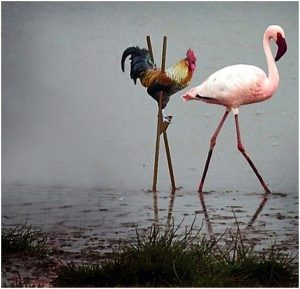 This is a very interesting story in Greek mythology which explains the term “Love is blind.” Please read it. It’s the story of Cupid who is called “the god of love” and Psyche who was the most beautiful woman.
This is a very interesting story in Greek mythology which explains the term “Love is blind.” Please read it. It’s the story of Cupid who is called “the god of love” and Psyche who was the most beautiful woman.
Psyche was the most beautiful woman in her land and it seems men came to take a glimpse of her from faraway lands. This reality infuriated Aphrodite, the goddess of Beauty and mother of Cupid as her temple used to be visited in large numbers but when people learnt about Psyche, she started getting all attention and Aphrodite was neglected. Hence, Aphrodite asked her son to use one of his arrows to make Psyche fall in love with ugliest man in the world. Cupid being an obedient son went to shoot an arrow at Psyche as he spotted her looking at the ugliest man in the crowd outside her house, but the moment he noticed her face, he dropped the arrow which fell on his foot and this made him fall in love with her. But he couldn’t marry her because that would annoy his mother and also because he was a god and she was a mortal.
Meanwhile Psyche’s father was worried because everyone wanted to look at Psyche or meet her but no man wanted to marry her for she was so beautiful and each man thought it would be difficult for him to look after her. Psyche’s father went to Zeus’ temple for advice. Zeus decided to play Cupid’s wingman, also it was predicted that Psyche would marry a demon. Psyche’s father was advised to drop her at a mountain peak on a moonless night so that the demon could take her away to his land. Her father was hassled initially but after a lot of emotional drama he left her at the mountain peak for her destined husband to pick her up. She obviously couldn’t see who he was because it was dark; he took her to a palace above clouds which was again totally dark.
Her husband explained the rules of their marriage to her: she will not see him as he would only visit her at night in the dark without any lights. She will not make any contact with her family. During the day, invisible servants would take care of all her needs. He also told her that he would leave her if she ever tries to see his face.
 So night after night he visited Psyche and she obviously got a feeling that he’s not a demon but hiding something else because you know, he felt like a person probably with decent enough features. After both became familiar to each other, Psyche coaxed him one day to let her talk to her sisters and allow them to visit her. He permitted. Her sisters came to visit her and got a little jealous of her palace and her demon husband who was very caring. They told her to hold a lamp over his face when he falls asleep that night to see how he looks. She did exactly that, knowing well that he would leave her if she’s caught, because she just had to know what he was hiding. She realized that he was Cupid, the most handsome god and not an ugly demon.
So night after night he visited Psyche and she obviously got a feeling that he’s not a demon but hiding something else because you know, he felt like a person probably with decent enough features. After both became familiar to each other, Psyche coaxed him one day to let her talk to her sisters and allow them to visit her. He permitted. Her sisters came to visit her and got a little jealous of her palace and her demon husband who was very caring. They told her to hold a lamp over his face when he falls asleep that night to see how he looks. She did exactly that, knowing well that he would leave her if she’s caught, because she just had to know what he was hiding. She realized that he was Cupid, the most handsome god and not an ugly demon.
But cupid woke up and shocked her, his sudden action hit the lamp in Psyche’s hand and a jolt made the hot oil from the lamp fall into his eyes. The hot oil made Cupid blind. He got really angry with her for breaking her promise and spill out oil in his eyes. Psyche tried to console Cupid, she begged of him to not leave her, but he left her. Psyche tracked cupid down and found that he was living with his mom, who obviously didn’t like her and thus instead of saying no to her, she promised that she would allow her to see Cupid if she accomplishes few unfeasible tasks. Psyche agrees to do those impossible tasks because of her desperation. She accomplishes everything and gets to see Cupid and discovers that he is blind because of her oil spill.
The story goes further that after becoming blind Cupid still runs around hitting anyone with arrows at any time and sometimes he forgets to hit the other person all together. Therefore, love is blind!! As a result often love is chaotic madness.
 We most often see that lovers are blind to the beloved’s negative traits and tend to create an idealized (imaginative) image of the beloved. When people fall in love, they fantasize idealized traits in their lover rather than the real ones. We go blind when we fall in love. Indeed people often say that they are living out their dreams with their beloved. Positive illusions are in fact central to romantic love. Lovers do not see clearly their beloved’s negative traits and tend to create imaginative traits instead.
We most often see that lovers are blind to the beloved’s negative traits and tend to create an idealized (imaginative) image of the beloved. When people fall in love, they fantasize idealized traits in their lover rather than the real ones. We go blind when we fall in love. Indeed people often say that they are living out their dreams with their beloved. Positive illusions are in fact central to romantic love. Lovers do not see clearly their beloved’s negative traits and tend to create imaginative traits instead.
One reason for idealizing the beloved is that we tend to evaluate positively that which we desire. Our preference leads to its positive assessment. Idealization of the beloved may also be considered as a kind of defense mechanism, enabling us to justify our partly subjective choice. A similar defense mechanism works when a person buys a new car, and refuses to look at its drawbacks; instead he harps on some ingenious features. Men seem to idealize women more than women idealize men. For example, a survey of love songs has found that females are more often described as “divine,” “angel,” “moon” than males.
Every person who falls in love experiences variety of agonies and pleasures of love. Each person has his/her own character and personality; they have different backgrounds and conditions. So there is no set of rule that applies equally to everyone. Also, whom a person dates is also a matter of personal choice. No one has any right to intrude in anybody’s private affair. The youngsters say, not even their parents. But, our heart and gut do give us signals about the right or the wrong person. Do we hear to them?
After few years of marriage, people are able to indicate their partner’s character defects, physical defects, and bad habits. Moreover, we may love an evil person, an unintelligent person, an aesthetically unpleasant person, or an arrogant person while knowing this person to be so. The cognitive change of gaining additional negative information about the person does not necessarily lead to separation. However, if love is to be sustained, the cognitive change must be accompanied by an evaluative change compensating for the new negative information.
Most married people In light of the complexity typical of love and the fact that lovers are often unwilling to face reality commit self-deception. They curse their choice and their blindness in initial phase of falling in love. Perhaps because of the battle between good and bad in our character, we get attracted to the opposite of what we are. Don’t we often see, a nice guy, falling for a nasty female and the vice versa? The lust you feel for someone different not only adds an element in your life that was previously missing, but it also adds to the challenge of sustaining the gap. It is certainly one explanation for why the sweetest of girls end up with the biggest jerk around. And, a good guy follows the devilish girl. The challenge of conquering the heart of someone very opposite than what a person is adds to the passion.
 The initial ignorance of the person’s characteristics, which is expressed in idealization, is later replaced with a more realistic picture based upon new and more detailed information. Many divorcees testify that their partners cheated them; and they mistook their partner’s characteristics. The lover’s blindness is not necessarily due to misperception of the beloved’s traits; it may also be a matter of distorted evaluation in the sense of focusing upon positive qualities only.
The initial ignorance of the person’s characteristics, which is expressed in idealization, is later replaced with a more realistic picture based upon new and more detailed information. Many divorcees testify that their partners cheated them; and they mistook their partner’s characteristics. The lover’s blindness is not necessarily due to misperception of the beloved’s traits; it may also be a matter of distorted evaluation in the sense of focusing upon positive qualities only.
Because people often lose all objectivity when they fall in love, it is said ‘Love is blind’.













































